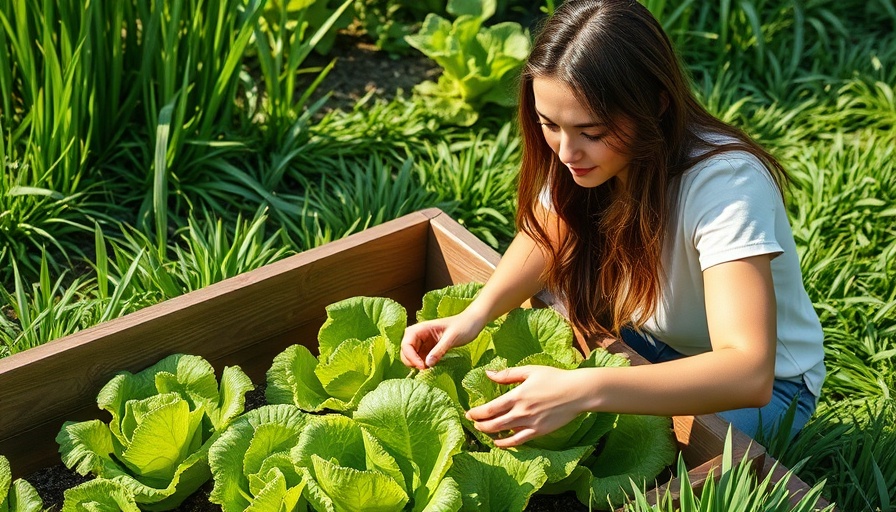
Why Choose Organic Gardening Over Pesticides?
Many aspiring gardeners feel the pressure of pests ruining their hard work. The immediate response typically includes pesticides, despite their harmful effects on both health and the environment. According to Barbara Pleasant, an organic gardening expert, by adopting natural methods, individuals can not only protect their garden but also contribute to a healthier ecosystem.
The Importance of Biodiversity in Your Garden
One vital element in organic gardening is embracing biodiversity. Myriad species, including beneficial insects and birds, significantly contribute to pest control. For instance, planting a diverse range of flowers and herbs attracts insects like ladybugs and bees, which can help manage pest populations naturally. Pleasant emphasizes that “common garden-lovers such as bees, wasps, birds, frogs, and butterflies eat harmful insects and help cross-pollinate fruit-bearing plants.” By including such flora in their garden design, gardeners can create a balanced ecosystem that supports healthy plant growth.
Regular Maintenance: A Gardener's Tool Against Pests
Regular visits to your garden play a crucial role in pest management. Actively scouting your plants allows gardeners to identify problems before they escalate into more significant issues. Pleasant suggests frequent check-ups to familiarize oneself with the local insect population. By doing this, you can easily differentiate between helpful allies and harmful pests. Moreover, addressing infestations early can often prevent lasting damage to your plants.
Understanding Your Garden Pests: Identification is Key
It’s essential to identify the pests in your garden accurately. Many common garden pests can be easily misidentified. Utilizing identification apps such as iNaturalist can streamline the process and facilitate effective treatment measures. Understanding the specific pests in your area helps determine the appropriate strategies for organic pest control.
Ten Proven Organic Pest Management Techniques
Building on the fundamentals of organic gardening and pest management from Pleasant's expertise, we compiled ten effective strategies to keep your plants healthy without the use of harmful chemicals:
- Crop Rotation: This challenges pests by changing the landscape they inhabit, disrupting their lifecycle.
- Hand-Picking: A simple yet effective strategy for larger pests like caterpillars. Growers should take time in the dawn or dusk to remove these invaders manually.
- Companion Planting: Some plants naturally deter pests when grown together. For example, planting marigolds alongside your vegetables can help ward off insects.
- Homemade Insecticidal Soap: By mixing a few tablespoons of mild soap with water, you can create a natural pesticide effective against softer pests like aphids.
- Essential Oils: Employ oils like peppermint and rosemary, known for their pest-repelling qualities. They can be mixed with water and sprayed around your plants.
- Diatomaceous Earth: This powder, composed of microscopic fossilized organisms, is effective against hard-shelled pests.
- Beneficial Insects: Introduce insects like ladybugs and lacewings that naturally feast on common pests.
- Baking Soda: Baking soda can be mixed into water and sprayed on plants to combat fungi and pests alike.
- Neem Oil: This natural oil acts as both an insecticide and fungicide, disrupting feeding among pests.
- Barriers and Traps: Using floating row covers can help protect young plants from insects while allowing sunlight and moisture in.
The Shift to a Healthier Gardening Method
Transitioning from conventional to organic gardening often requires patience and commitment. It’s worth noting that, as evidenced by many seasoned gardeners, adopting these techniques leads to stronger plants over time. After a few growing seasons, not only is pest control more manageable, but the soil and plants thrive in an organic ecosystem.
Find the Right Balance: Your Garden’s Health
The importance of having a healthy soil ecosystem cannot be understated. Healthy soil leads to robust plants, naturally resisting pests. The soil bacteria and microorganisms interact symbiotically with plant roots, ensuring nutrient absorption and overall growth. Using organic soil amendments—like compost—further enhances this relationship.
Closing Thoughts on Organic Pest Control
While transitioning to organic gardening may seem challenging at first, the long-term benefits far outweigh the initial labor. Not only do you cultivate a more sustainable environment for yourself and future generations, but you also contribute positively to local wildlife and plants. Embracing these natural methods allows everyone—from novice gardeners to seasoned horticulturists—to create flourishing gardens that are as healthy as they are beautiful.
As you embark on your organic gardening journey, educate yourself on these practices, reach out to local gardening communities for support, and stay engaged with the process. Your garden’s future relies on your dedication to creating a thriving ecosystem.
 Add Row
Add Row  Add
Add 




Write A Comment